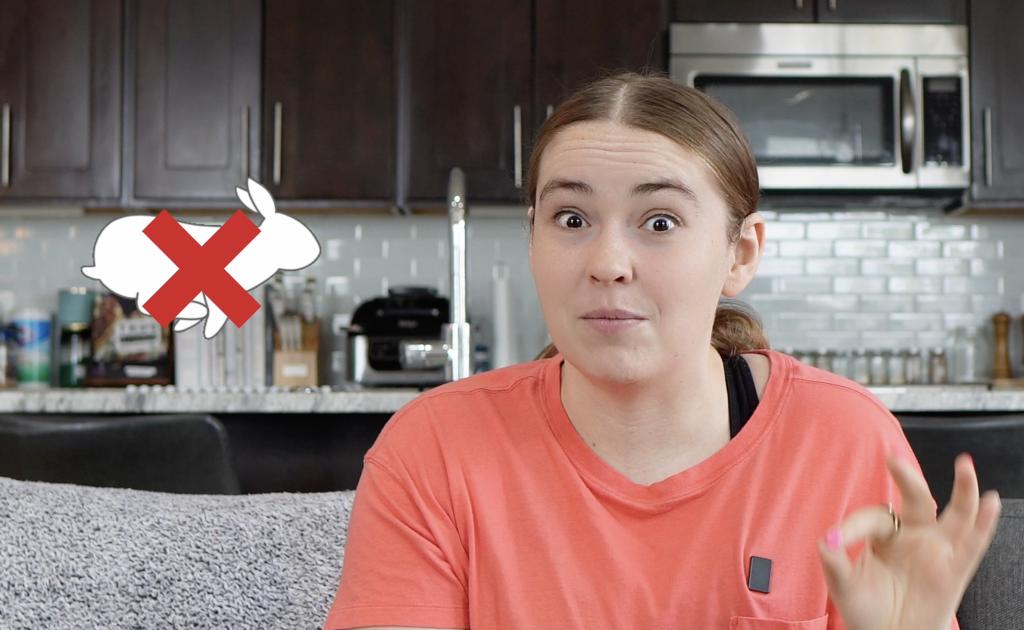Stop Trying To Break Bad Habits
August 28, 2023
For the love of all things behavioral change, please stop trying to break your bad habits.
Hi, my name is Dr. Karin Nordine and I am a PhD level expert in all things mindset and behavior science, and I work with a ton of people who come to me who have a vision for their future self.
They ask me questions like:
-
- How do I get rid of my bad habit of snacking at night?
-
- How do I get rid of my bad habit of scrolling?
-
- How do I get rid of my bad habit of skipping the gym?
Important Note: I want to say that there is no morality to habits. There is no such thing as a good or a bad habit. Some habits are helpful and some habits are less helpful. But if there are things you want to reduce or get rid of in your life, focusing on reducing or getting rid of those things is not the right approach.
So in this blog, I’m going to teach you what the right approach is and why it’s scientifically backed and truly is going to work much better for you in the long run.
Prefer to learn on video? Watch here:
1. Transitioning from Avoidance to Approach Goals
The first reason I want you to stop focusing on trying to break bad habits is because of the difference between something called an approach goal and an avoidance goal.
Avoidance Goal = something that you want to avoid or something that you want to reduce.
For example, I want to stop scrolling when I get home from work at 5:00 PM. The problem with avoidance goals is they tell your brain what not to do, but they don’t tell your brain what to do.
And with that lack of clarity, it can mean that when you come home at 5:00 PM and you’re tired, if you don’t have an alternative set up, you are basically going to dive right into that bad habit.
Instead, when you have something that you want to get rid of out of your life, I would encourage you to set an approach focused goal.
Approached Goal = something that you want to do.
For example, I want to read for 15 minutes when I get home from work every day. Having clarity on what you’re going to do in order to replace that “bad” habit is going to give your brain something to move towards.
It’s more specific, it’s directional, and it’s something that your brain is going to have a lot easier of a time working towards and comprehending than simply trying to avoid the thing.
If you’ve heard the classical psychological trick of “don’t think about a white rabbit”, the harder you try to not think about a white rabbit, the more you’re going to think about that white rabbit…
This is the exact same thing that’s happening when you focus all your efforts on that avoidance goal rather than focusing on what you could add to your life instead.

2. Unraveling the Purpose Behind Bad Habits
The second thing I want you to do if you’re trying to break bad habit is to focus on what that bad habit is actually bringing you.
So for example, if you’re snacking late at night, and let’s say it’s disrupting your sleep…
What emotional, psychological or physical need are you actually getting met by that snacking? Maybe that snacking is giving you a sense of groundedness, or a sense of entertainment. Maybe you’re actually hungry and that snacking is fulfilling your energy needs for the day.
By figuring out exactly what that bad habit is solving for, you are going to be able to create a new habit that’s going to better replace it.
For example, some people seek out food as a sort of sensory need. You need to be able to feel and touch something, and that helps you be grounded in your body.
So replacing that snacking habit with knitting or something where your hands are moving is going to be way more effective than:
A: Simply trying not to snack.
B: Replacing it with something that doesn’t fill that need.
One of my favorite sayings from my former employer, Precision Nutrition is that,
“Every behavior is an attempt to solve a problem.”
So if you stop thinking about your habits as bad and you start getting curious about what problem your brain is trying to solve while driving you towards those things, THAT is going to be a way more helpful approach.
3. Preemptive Action: Addressing the Triggers
Finally, the third thing I want you to do instead of focusing on your bad habit is I want you to focus on what happens in the 3-5 hours before that bad habit starts to appear.
For example, let’s say you have the bad habit of procrastinating your bedtime.
You lay in bed and scroll TikTok over and over until it’s way too late and you know you’re not going to get enough sleep.
In that case, I would look at the 3-5 hours beforehand and I would ask yourself, “What can I do in these 3-5 hours that fulfills that need or maybe even places that behavior earlier?”
For example, maybe you give yourself 30 minutes of designated scroll time after dinner, and then you put your phone away so that you’re not scrolling later at night.
By backtracking and figuring out how you can fulfill that need earlier in your day or even how you could prevent the stress or chaos or whatever’s driving you towards that habit in the first place… This is how you change.
Focusing on prevention is going to be way easier than trying to hyper-focus on that bad habit and stop it immediately when it’s occurring.

We believe in the power of collective insight. Share your avoidance goal in the comments section below and we’ll help you rewrite it into an approach goal. Let’s collaborate to fine-tune your objectives for greater success.
Remember, stress can heavily influence habits, so check out this other blog on managing stress’s impact on your goals and habits HERE.
For even more practical guidance, be sure to join our Tuesday Toolbox email list HERE. We send out tangible emails every single Tuesday, giving you behavior change tools and application-based activities you can use to help change your life in the direction that you’re looking for.
COACHING & MEMBERSHIPS:
⭐️ 1:1 Help + Accountability (Alliance Coaching)
???? Monthly Workshop + Education (Change Academy)
FREE RESOURCES:
???? FREE Future Self-Mapping Mini-Course
???? Get weekly behavior change tips, delivered to your inbox.
BODY BRAIN ALLIANCE: Compassion-First Change Education
???? Subscribe on YouTube
???? Follow Body Brain Alliance on Instagram
???? Follow Karin on Instagram
???? Website: https://bodybrainalliance.com
Follow us
© Body Brain Alliance 2026. All rights reserved. Terms & Conditions | Disclaimers | Privacy Policy